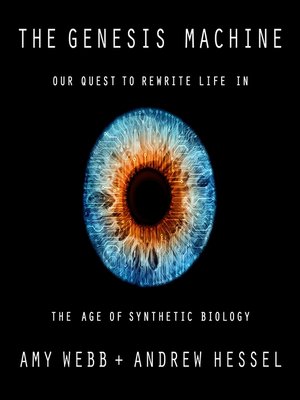The Genesis Machine
audiobook (Unabridged) ∣ Our Quest to Rewrite Life in the Age of Synthetic Biology
By Amy Webb

Sign up to save your library
With an OverDrive account, you can save your favorite libraries for at-a-glance information about availability. Find out more about OverDrive accounts.
Find this title in Libby, the library reading app by OverDrive.



Search for a digital library with this title
Title found at these libraries:
| Library Name | Distance |
|---|---|
| Loading... |
What if the miracle that created mRNA vaccines is less a once-in-lifetime event and more the harbinger of the emerging age of synthetic biology? This fusion of biology and computers has a singular goal: to gain access to cells in order to write new––and possibly better––biological code.
Synthetic biology promises to reveal how life is created and how it can be re-created, enabling scientists to rewrite the rules of our reality. It could help us, for example, heal without prescription medications, grow meat without harvesting animals, or confront our looming climate catastrophe. Synthetic biology will determine the ways in which we conceive future generations and how we define family, how we identify disease and treat aging, where we make our homes, and how we nourish ourselves. Soon, we will program living, biological structures as though they were tiny computers.
But who should decide how to engineer living organisms? Whether engineered organisms should be planted, farmed, and released into the wild? Should there be limits to human enhancements? Amy Webb and Andrew Hessel's riveting examination of synthetic biology and the bioeconomy provide the background for thinking through the upcoming risks and moral dilemmas posed by redesigning life, as well as the vast opportunities waiting for us on the horizon.
Synthetic biology promises to reveal how life is created and how it can be re-created, enabling scientists to rewrite the rules of our reality. It could help us, for example, heal without prescription medications, grow meat without harvesting animals, or confront our looming climate catastrophe. Synthetic biology will determine the ways in which we conceive future generations and how we define family, how we identify disease and treat aging, where we make our homes, and how we nourish ourselves. Soon, we will program living, biological structures as though they were tiny computers.
But who should decide how to engineer living organisms? Whether engineered organisms should be planted, farmed, and released into the wild? Should there be limits to human enhancements? Amy Webb and Andrew Hessel's riveting examination of synthetic biology and the bioeconomy provide the background for thinking through the upcoming risks and moral dilemmas posed by redesigning life, as well as the vast opportunities waiting for us on the horizon.







